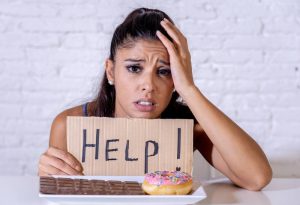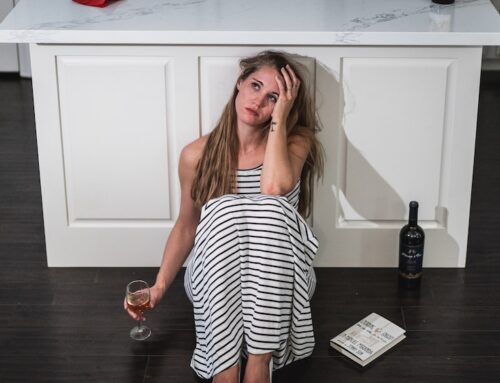The Other White Powder: My Addiction to Sugar
By Alicia King
In that first meeting I went to for my sugar addiction, I heard others admit to doing the same things I did. Sneaking. Lying. Throwing food in the bin to halt a binge only to come back later and fish it out to eat.
Woman with sugar addiction, has upset face and “Help!” sign in front of plate with sweets.
What if the notion of moderation is the very thing that keeps some of us monumentally stuck?
It was right in front of my face but I couldn’t see it for what it was for years: Addiction is a wayward beast. Christ knows you can’t see much when you’re laid flat on your back, pinned down by invisible yet ferocious forces.
The narrative was just so unfamiliar that I doubted it was real. Where were the used syringes, grubby spoons, and Ewan McGregor swimming in a lav to Brian Eno music? Where were the gin and tequila bottles strewn next to stained ashtrays?
A glance into my dependence only revealed brightly colored plastic wrappers and packaging, crumbs strewn on the car floor, stomach pains, abominable flatulence, and soft velvety chocolate stains on the couch and seat of my pants. Far from Trainspotting or Leaving Las Vegas, this was more like Leaving Seven Eleven.
It was almost laughable, only it wasn’t, it was excruciating. I ate the way an alcoholic drinks and an addict uses. The notion that food could derail a person the way hard drugs or booze can sounds extreme. And whilst the destruction is not as ostensibly violent and as speedily lethal, my spirit was decaying.
When you’re enslaved by compulsion and obsession, no matter what the substance or behavior — you suffer. Your inner freedom withers away and you are caught in a most painful cycle.
I could not stop binge eating. And for some reason I never equated my lawless benders on sweet things as a bona fide addiction. Denial is blinding but it wasn’t only mine. I was seeking the help of health professionals — psychologists and health counselors — who were also missing the reality of the problem. They would say “But it’s not that bad, right?” and minimize my behavior in an attempt to make me feel better. But it was that bad, and their diminishing comments made me feel worse.
They were kind and well intentioned and approached the issue by trying to help me find moderation in my relationship with food, namely sugar: my white powdery blow. I’d find that balance for periods — sometimes days, weeks or even months — but I’d inevitably topple into blowout. And I’m not talking a couple of pieces of cake or a tub of ice cream.
There is a cultural denial around the legitimacy of sugar and food addiction and treatment for disordered eating is usually centered around balance. And that is the ideal solution. But what if that doesn’t work? What if the notion of moderation is the very thing that keeps some of us monumentally stuck?
My continual failure to eat “normally” left me bereft and berating myself for my inability to halt this self-abuse. I couldn’t implement what I was being advised to do. What in hell was wrong with me? I’ve never had a DUI for drunk driving, but I have shamefully dinged my car (and others) more than once as I scoffed food blindly from the passenger seat.
I’d swear off bingeing; writing and typing up resolutions only to rip them up or delete them when I’d inevitably slide into another spree.
Then one day the penny dropped when a health counselor I’d been working with for four years said, “I’ve got it…You’re addicted to sugar!” Well yeah…anyone could see that, but what was her point?
She told me I needed to treat it like a legitimate addiction, find a support group, and face the fact I couldn’t eat processed sugar in moderation, which meant not eating it. At all.
At all. The suggestion seemed not only cruel, but blatantly impossible. I didn’t know a single person who didn’t eat sugar. What a farcical idea. And yet I knew she spoke the truth so I went out and binged.
I googled and found a 12-step group for overeaters. Begrudgingly and only because she kept hassling me, I went as I was desperate and had begun to experience the onset of chronic pain and digestive problems: the inescapable physical consequences of treating my body like a garbage bin.
In that first meeting I listened to others talk about doing the same shameful things with food that I did. Sneaking. Lying. Throwing food in the bin to halt a binge only to come back later and fish it out to eat. Feeling as if your insides were going to erupt with fullness and being unable to stop stuffing your face.
Shame released its chokehold on me as I saw I wasn’t alone. And I was okay. I wasn’t a bad person even if I continued to binge. I was doing something that was bad for me, but I wasn’t bad. Self-loathing gave way to…well, it must’ve been grace, and I felt an ache for the girl in me who’d strained for so long under the weight of something much bigger than her.
For the first time in over 15 years, and at the age of 34 with three young children, I had the wherewithal to choose. Prior to that I hadn’t perceived the freedom of choice. I’d been ruled by compulsion. All I knew was I didn’t want to live out that painful cycle anymore.
So I surrendered to reality. And I kept going to meetings, connecting with others who had been or were struggling like me. Doubt would creep in at times as to whether this was the right path, but I kept going along that bumpy path, and somehow, one day at a time, I let go of my sweet poison.
And the inhumane fate of a life without sugar? It was revealed to be the very opposite and I began over time to experience a newfound freedom with food and in life.
Having long struggled with bouts of suicidal depression and anxiety, the improvement in my mental health was indisputable. Not only to me, but to those around me including my husband and mum. I knew my sugar habit was unravelling my life, but I had no concept as to how much my life could blossom when I became unstuck.
I’m not an advocate for demonizing sugar, or booze, or whatever substances or activities people indulge in for pleasure. The reality is many people can and do enjoy these things and I reckon that’s great.
But for me, I crossed a tipping point somewhere along the line where a chocolate brownie was no longer a single chocolate brownie that could be eaten and left at that; it opened up an insatiable craving for more, and with that came far more pain than joy.
I had given up all hope that I could ever find peace from this affliction. And ironically it was throwing in the towel in desperation that allowed me to succumb to the truth and seek the help I needed to change. Even when you think it doesn’t exist, there is always, always hope.


